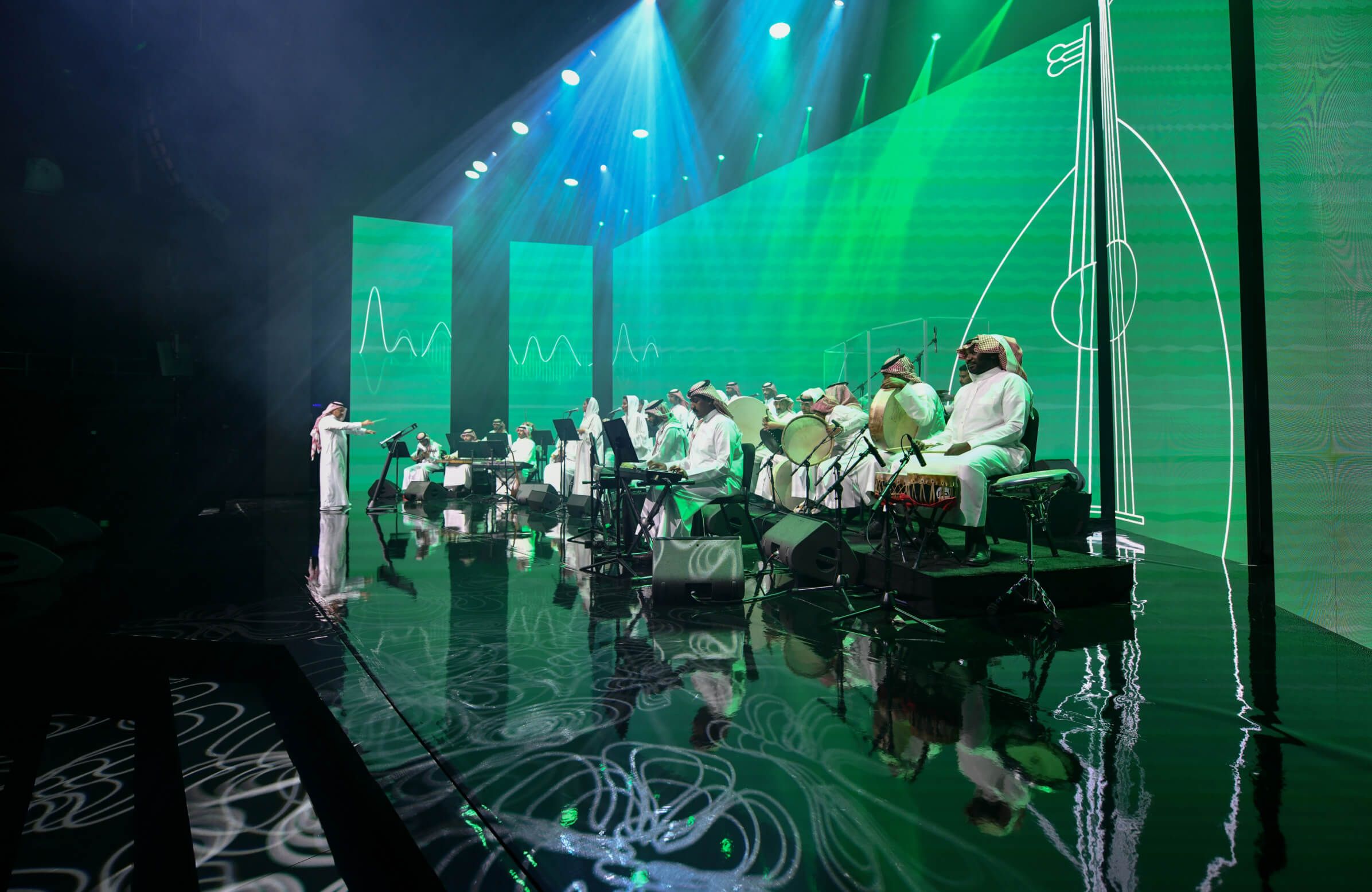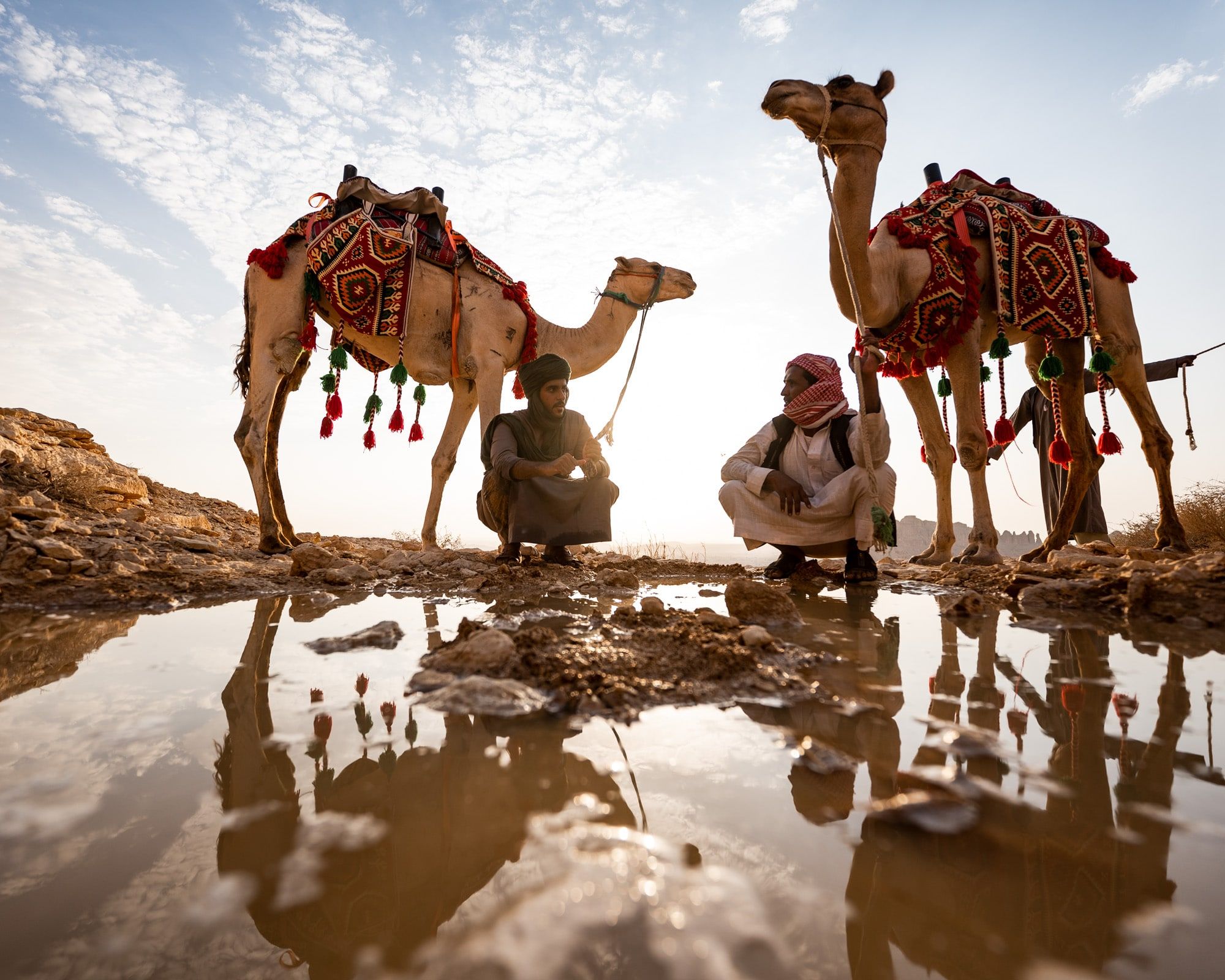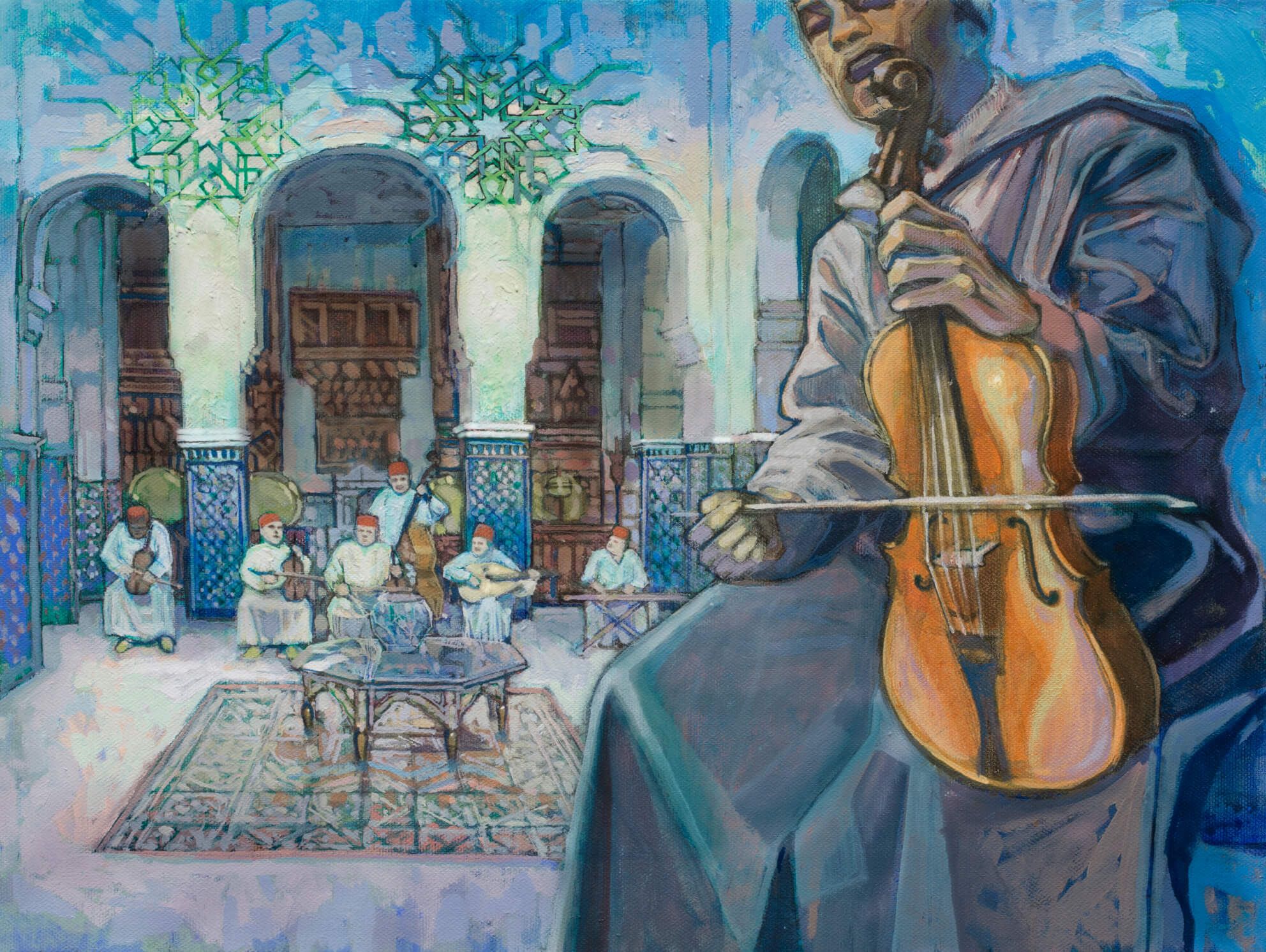Life in Music, with Maestro Yahya Masawa
WATERCOLOR ON PAPER BY NORMAN MACDONALD (MACDONALDART.NET)
He loved world music from a young age, and was fond of the music of Beethoven, Mozart, Tchaikovsky, Haydn, Bach, and others, while his peers spent their money on sweets and local songs, he searched for a suitable place to study music in Riyadh, but it did not work. He turned to football to compensate for his passion for music. He was accepted into the school of Al-Hilal Football Club while he was still in the third grade of primary school, and trained under the supervision and interest of the international coach, Brosch, who lavished on him with caring fatherhood on the field, to the point of affording to pick him up from home and bring him back in his car when he did not find transportation, to ensure that he continues his training, and to come into contact with the older generation of players, such as Youssef Al-Thunayan and his generation, to acquire skill from them.
They were also in the custody of the Yugoslavian coach. His modest academic results did not satisfy his father, so he had to abandon the ball and continue his studies. After about a year, the management of Al-Hilal club called his father to have him play with the youth team in return for a relatively rewarding financial compensation. His father agreed on the condition that he search for a job that secures his future. He agreed and started looking for a sports job, and he was unsuccessful. While searching for a job, he came across an advertisement for military musical jobs, and this was the turning point in the life of musician Yahya Hassan Masawa, who finally found an outlet for his early passion. Ithraeyat met with him and this was the dialogue:
Tell us how things went with you after finding your chance to return to music?
In the Army Music Institute, I was welcomed and accepted after auditory and sensory tests, with a special recommendation from the Chairman of the Admission Committee that I take special care to pursue the study of music. I distributed my time between football and music, and achieved success in both places for a year, but the management of the conservatory noticed my absence every day from twelve in the afternoon until ten in the evening, which is contrary to the regulations of the institute, as I must stay there seven days a week for a period of two years except for Thursday and Friday. I was given the choice between two things, either to commit to the institute or to leave it for the football field, so I chose music and finished the course with distinction, which paved the way for me to continue my studies in the preparation of trainers course, which was the best course in the Kingdom.
At first I refused because I had to pass two preliminary courses, but I was excluded from them due to my musical talent. My start in this course was difficult because most of the participants are nearly thirty years old, almost twice my age. The challenge was great, but I succeeded because of my faith in God, my self-confidence, and the support of the officials at the institute. I remember my early passion for music, and I wondered if it was just enjoyment or an overwhelming desire for knowledge, with years of study, I discovered that music is a vast, unlimited science. I ranked first at the end of the course, and my career with music began when I received the institute’s band, then I was sent abroad to train in conducting orchestras, and I excelled in the participating countries, and I took it upon myself to nurture and develop talents in my dear country, and I wrote a lot of artwork, especially books and diverse musical references because I knew what the new generation needed.
What is your favorite musical instrument? And why?
I work on a lot of musical instruments, maybe twenty instruments between (brass) (feathers) (percussion) and (strings). In the category of brass instruments, I like the trumpet, and in percussion instruments the alto saxophone, and in strings the violin, and in percussion the drums. The instrument closest to my heart and through which I can express what is in my heart is the piano, the instrument of international composers.

Yahya Hassan Masawa, sing along concert at Ithra, 2022. Courtesy of Ithra.
Tell us about the history of music in the Arabian Peninsula, and what are the different periods it went through?
The cultural heritage in our country includes several arts, including performance, and singing is considered one of the collective arts that contain the art of performance: that is, the voice of the throat and the instrument, and the art of saying: that is, the poetic text, and the art of movement: that is, rhythm, play, or accompanying dance. Musical and lyrical creativity throughout the long history passed through several stages in the Arabian Peninsula, specifically in the Hijaz (Mecca and Medina) and had an important social and human aspect in the demographics of the region, which witnessed continuous cultural and artistic creativity. Among this creativity is the poetry closest to singing, and it was famous at a time called the Umayyad era.
Regarding the history of music in the Arabian Peninsula in the first era, Arab music included many different musical cultures, ranging from classical music, popular music, and others. Arabic music has a long history of development and interaction with different civilizations, the most important of which are: ancient Egyptian, Greek, Persian, Kurdish, and others. The development of Arabic music can be linked to several changes in time, in which it witnessed a great development, and qualitative shifts until it reached what it is now. We summarize them as follows:
First: the pre-Islamic period (i.e. the ignorance period), there are indications that there were several forms of music at that time in the Arabian Peninsula between the fifth and seventh centuries, and the evidence for this is the presence of pre-Islamic poets at that time, whose poetry and poems were recited with beautiful musical rhythm and melodies. .
Second: The post-Islamic period, Andalusia witnessed a renaissance that indicated the great rise of Arabic music, specifically in the eleventh century, when Andalusia, at that time, became a commercial center for the manufacture and export of musical instruments, the most important of which is the oud. Arabic music did not show elaborate singing and studied knowledge until after Islam, when male and female singers came to Hijaz, some of whom were of Persian origin, and most of them were fluent in poetry and singing, such as: Izzat al-Maila’ - Ma’bad - and Ibrahim al-Mawsili and his son Ishaq al-Mawsili - Ziryab, who migrated to Andalusia and opened schools for teaching music there, so the science of music appeared and musical rules and theories were laid down by great philosophers, including: Al-Kindi and Al-Farabi.
We note that this beautiful heritage of arts, especially singing and music, has entered the overall cultural structure of Saudi society and has become an integral part of it, passed on from generation to generation, and memorized by one generation from the other after that, through collective practice, oral transmission, and their social and cultural events were celebrated with it. And the geographical location of the Kingdom of Saudi Arabia contributed a lot to the development of culture within the country, especially religious tourism, which made it a destination for everyone related to poetry and singing.
While technically, the Kingdom consisted of several regions;
The first is the Western or Hijazi: Mecca, Medina, Taif, and Yanbu. The second is the Middle or Najdi region: Riyadh, Sudair, and Qassim, and the third is the southern region: Asir, Najran, and Jazan. The fourth is the eastern region: Al-Ahsa and Al-Qatif. Finally, the Northern Region: Hail, Tabuk, and Al-Jawf
How did the diversity of cultures in the Arabian Peninsula affect its melodies?
What is beautiful in the world of creativity is the transfer of experiences, and one of the most important successes is the difference in musical cultures, so nothing remains the same, because if Arab music had only one character, we would not have taken a step forward, but the difference is what created an aesthetic spirit in our singing and music, and the witness on this, there are many songs by artists (without mentioning names), most of their music is derived from Western music, and had it not been for this artistic mixing, we would not have heard wonderful sweet melodies, and this is evidenced by what the musician Muhammad Abdel-Wahhab presented in his musical melodies that mixed between the western and the eastern, as well as the melodies of Rahbani brothers in All songs Fairouz.
How do you assess the status of Saudi music currently?
To some extent acceptable, and the reason is the absence of many poets, and many of them stopped poetry. When we have poets with the capabilities of Prince Khaled Al-Faisal, Prince Badr bin Abdul Mohsen and poet Ibrahim Khafaji, we can say that the song will return to its glory in the sixties, to the days of Talal Maddah and Muhammad Abdo. I say to my students at Thaqqif Institute whom I teach about vocals: Your voices have become very wonderful, but God help you, who is the poet who will present this voice!
And the Kingdom of Saudi Arabia is currently in a state of artistic alert in all aspects, on various artistic levels, especially: music, instrumental playing, and singing, as wonderful lyrical outputs, according to high artistic standards. The situation is currently excellent in light of the opportunities available for the promotion of music and singing in particular, by officials in our dear country, to achieve what keeps pace with the ambitious vision that hopes to reach universality in various artistic fields.
What are the things that a Saudi artist needs to raise the Saudi song to the world?
The artist must realize that what was in the past was achieved with great struggle and efforts because the support was very limited, so the previous generation was digging in the rock to reach glory. And now we are saying thank you to them by crowning them at national events in the Kingdom. This is evidence that the old male and female artists have done all they have of creativity. The new generation should be aware of the size of the responsibility and try to gain great experience from the previous generation, especially the characteristic of patience in the beginnings, an attempt after an attempt until they reach the stage of artistic maturity and lyrical integration. They must know that there is a difference between the imitator, the performer, the singer, and the vocalist. These differences will be discovered in the future through their artistic performance on the stage.
Also, it is necessary to practice music as a performer, and to choose a musical instrument such as the oud, the piano, or others, to help him listen well to many Arabic maqams, and to sing them scientifically and not through imitation, there must be diversity in choosing songs, and in all national, classical and tarab songs. It is very important to study the exits of the letters so that the song delivers its content, whether it is colloquial or classical.
After more than 30 years in the field of music, what is the most important lesson you have learned from music?
In fact, I will complete my 39th year after six months in the field of music, and I am still learning something new every day. The magic of music is the magic that takes you to a beautiful world, purifies the soul and makes it loose in your own world. To think carefully about what life is like in terms of honesty, love and safety. Music taught me patience to achieve goals. The most important lesson I learned in my music career; is that; there is no success without obstacles, and there is no paved way to success without hardships, but with the grace of God and patience, I have learned in this world everything is possible, provided that you have a goal and ambition towards the future of creativity. The world of music is a world that requires patience, and in every piece of music I start with, I feel like I'm fighting a win-or-lose battle, and I don't hide, when I finish a piece by Mozart, or Beethoven, I feel victorious in those musical battles, not to mention the feeling that I live in another world of joy and happiness when touching the piano or when I lead a band.
How do you see the new talents at the Thaqqif Institute, and can the new generation revive and preserve the culture and heritage of Saudi music, knowing that the influence of European and Western music is great on the new generation.
The musical or lyrical talents that the maestro created with Thaqqif’s Institute are now the true supporter of the homeland in many forums, and this is evidenced by the musicians in the national band who include a group that graduated from the maestro, as well as choirs and singers. Academic education worked on refining these talents. We have a choir now that stands behind the great artists in the Kingdom and all this in a very short period, not to mention the players of the rest of the disciplines, such as: (the piano, the oud, the violin, and other musical instruments). The academy on which the maestro worked integrated world music with oriental music, and we succeeded, thanks to God, because classical music has the power to specialize, and the music has a beautiful sense of playing when singing, so there was the concept of difference between the two cultures, and we achieved that goal through academic building, thank God. Certainly, the new generation is able to preserve the ancient heritage through participations in which new and old blood are merged with each other, to give the new generation the experience and nobility of the past. The previous heritage is rich, beautiful, and authentic in every sense of the word in terms of art. As for Western music, it is a necessity for all musicians or singers because of its academic power to learn music, and being influenced by it is present in many songs now in the musical arrangement, or the western rhythm, it is a very beautiful activity, this generation in the future will have the capabilities that make it the best among all generations, and this is what we hope and our leadership hopes, may God protect it.


